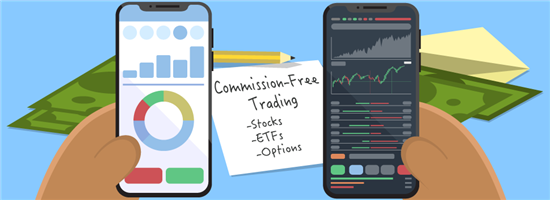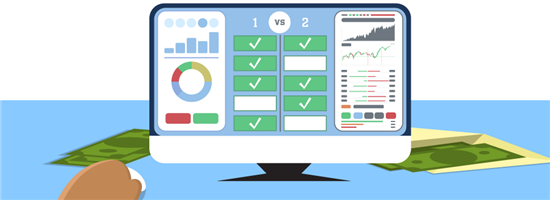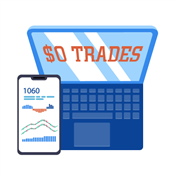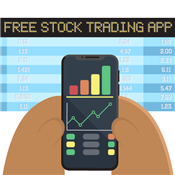Robinhood vs Webull
Robinhood and Webull both offer commission-free trades for stocks, ETFs, and options. Find out which free investing app is best for you.
 |
| © CreditDonkey |
Webull and Robinhood are two of the most popular trading platforms, and for good reason.
Both apps offer an accessible way to trade with zero commissions.
But there are some key differences you should be aware of.
Find out which one is best for you in this detailed comparison.
- About Robinhood and Webull
- Pros & Cons of Robinhood and Webull
- Head-to-Head Comparison
- Account Opening and Trading Fees (Tie)
- Sign up Bonus: Free Stock (Robinhood)
- Investment Options (Robinhood)
- Account Types (Tie)
- Trading Hours (Webull)
- Account Features (Robinhood)
- Research and Tools (Webull)
- Margin Trading (Webull)
- Day Trading (Tie)
- Paper Trading (Webull)
- Short Selling (Webull)
- Market Orders (Webull)
- Customer Support (Webull)
- Account Opening and Trading Fees (Tie)
About Robinhood and Webull
Robinhood
Founded in 2013, Robinhood's is best known for offering commission-free trading via their app.
With Robinhood, you can trade stocks, ETFs, options, and even cryptocurrency for no trade fees.
They're headquartered in Menlo Park, California and their services are currently limited to U.S. citizens.
Robinhood makes its money from directing user orders to market makers who then execute the trades[1]
Webull
Established in 2017, Webull is Robinhood's biggest competitor, also offering free stock, ETF, and options trading.
Webull aims to combine finance with technology to provide a better investing experience. It offers advanced real time market data, charting, and analytics to help users make smart decisions.
Webull makes money through their margin trading loan service. It also offers a paid subscription for real-time market quotes.[2]
Up to $100 Transfer Fee Reimbursement
Transfer fees of up to $100 will be reimbursed when you make an initial transfer of $2,000 or more.
Robinhood is better for beginners, as it's easier to use. Webull is a better choice for more experienced active traders, as it offers more advanced research and charting. However, Webull does have a practice paper trading account, whereas Robinhood does not.
Pros and Cons of Robinhood and Webull
Before diving into the detailed comparison, review these quick pros and cons below to see whether Robinhood or Webull sounds right for you.
Robinhood Pros and Cons
|
|
Choose Robinhood if: You're brand-new to investing, or you have less money to invest with
Webull Pros and Cons
|
|
Choose Webull if: You have a bit more investing experience, you want free access to margin trading, or you want more advanced research.
Key Differences of Robinhood and Webull
Only Robinhood offers:
- Deposits up to $1,000 are instantly available
- Cash Card account
Only Webull offers:
- Paper trading account (trading simulator)
- Longer extended trading hours
- Allows short selling
- More in-depth research tools and charts
What Robinhood and Webull have in common:
- Completely commission-free trades
- Stocks, ETFs, and options
- Individual taxable accounts and retirement accounts
- No account minimums
- Dividend reinvestment (DRIP)
- Margin accounts with $2,000 minimum
- Unlimited day trading for accounts $25,000+
- Real time market updates
- Web platform and mobile trading on Apple & Android
- Offers fractional shares
- 24/7 customer support online and by phone
Robinhood vs Webull: Head-to-Head Comparison
 |
| © CreditDonkey |
Dive into a detailed comparison of Robinhood vs Webull below. Consider which factors are most important to you to find the right fit for your investing needs. For example, do you need more research, more account options, or prioritize customer support?
Trading Fees and Account Minimums
Winner: Tie
Both Webull and Robinhood have no minimum investment requirement to get started.
Both offer commission free trading for stocks, ETFs, and options. Both have zero contract fees for options trading.
Both have no minimum account balances, unless you want to trade on margin (in that case, both require $2,000 minimum). Webull's margin account is free, while Robinhood requires you to upgrade to the Gold account for $5 per month for the lower rate.[3]
Sign up Bonus
Winner: Robinhood
Robinhood gives you one share of a free stock when you open an account, valued between $5 to $200. You can keep or sell the free stock after three trading days.[4]
Investment Options
Winner: Robinhood
Both Robinhood and Webull allow you to trade stocks, ETFs, and options with no trading fees.
However, Robinhood wins out because it offers crypto trading.
Neither trading apps offer mutual funds, bonds, futures, or forex.[6][7]
Account Types
Winner: Tie
Webull and Robinhood both offer individual taxable accounts and IRAs. Neither platforms offer joint, custodial, trust, or 529 college savings accounts.[8]
Trading Hours
Winner: Webull
Both offer free extended trading hours, but Webull's trading hours are longer:
Account Features
Winner: Robinhood
Fractional shares
Both Robinhood and Webull support fractional shares. This gives you the ability to just buy a tiny piece of a share if you don't have enough money for a full share. This makes both of them better for new investors without a lot of capital.
Dividend Reinvestment
Both Robinhood and Webull offer a Dividend Reinvestment program (DRIP). Any cash dividends are reinvested back into the specific stock.
Instant Deposits
With the default Robinhood account, you get $1,000 in instant deposits. This means whenever you make a deposit, $1,000 will be available to trade with immediately (instead of waiting the usual 5-6 days for ACH transfer to clear).
Webull does grant a partial credit before your deposit settles, but it's not as clear how much you get. The credit is based on your account type, cash balance, net account value, credit history, and other factors.
Research and Tools
Winner: Webull
Robinhood is a simple, beginner-friendly platform. It lacks the market research and tools of more advanced brokerages. Robinhood's tools include:
- Organize stocks by sector; compare stocks side-by-side
- Real-time market updates on stocks in your watch list
- Candlestick charts with 5 indicators
- View average price per share that Robinhood investors paid (helps you judge if the stock is a good buy or not)
Webull offers a more advanced trading experience. It has more analytic tools to help you get a handle on your investments, and thus a better chance to profit.
Extra features include:
- Price alerts for stocks in your watchlists
- Stock screeners
- Market data from 5 categories and 100+ exchanges[11]
- Charting with 50 technical indicators
- Analyst ratings for buying or selling an asset
Up to $100 Transfer Fee Reimbursement
Transfer fees of up to $100 will be reimbursed when you make an initial transfer of $2,000 or more.
Margin Trading
Winner: Webull
Margin trading is when you borrow funds from the broker to purchase stocks. This increases your buying power and have the potential for higher profits (but also higher risk).
Robinhood Gold requires a minimum balance of $2,000, and your first $1,000 of margin is included. If you borrow more than that, you'll pay 8% yearly interest on the amount you use above $1,000. You can also trade margin even if you don't subscribe to Robinhood Gold. But a lower margin interest rate is offered with Gold.
Webull edges out Robinhood because their margin account is accessible to everyone for no extra monthly fee. In addition, Webull's margin interest rate is lower than the rates available to Robinhood's non-Gold customers.
The margin rates decrease with higher margin loans. The minimum account value is also $2,000.
Day Trading
Winner: Tie
Both Webull and Robinhood allow you to perform up to 3 day trades in a five trading day period. For investors with $25,000 account balance or more, you can make unlimited day trades.
Robinhood also has a cash account option that has no restrictions on day trades. However, this account does not have instant deposits or instant access to funds, so you'll have to wait 5 days for funds to settle.
Paper Trading
Winner: Webull
Webull offers a paper trading account with $1,000,000 in fake money. You get access to all the full features of the platform. You can get used to it and practice trading strategies before committing real money.
This may sway the decision for beginners, especially if you want to try out different ideas or learn trading options.
Even though Robinhood is more geared towards beginners, it doesn't offer a practice trading account.
Short Selling
Winner: Webull
Webull supports short selling in its margin accounts,[12] while Robinhood does not. This is a trading strategy where an investor borrows shares and sells it to the market, with the bet that the stock price will drop. Then they buy it back at the lower price and return to the lender, thus making a profit.
This feature is available on Webull's mobile app, so you can execute a trade at any time on your smartphone.
Short selling is definitely for advanced stock traders. There is a lot of moral controversy surrounding this approach, but if this is something you may be interested in, Webull allows it.
Market Orders
Winner: Webull
Both Robinhood and Webull allow you to execute the following orders:
- Market orders
- Limit orders
- Stop orders (stop loss order)
- Stop limit orders
However, Webull wins because they also offer these advanced order types:
- Stop-loss/take-profit orders (bracket orders)
- OCO (one cancels the other)
- OTO (one triggers the other)
- OTOCO
Webull allows you to execute more advanced orders, so it's better for the more experienced trader looking to limit their losses when trading stocks.
Customer Support
Winner: Tie
Both Robinhood and Webull have a customer support team available 24/7 via email and phone.
Both offer a large help center on their websites, so you may be able to find the answer to your questions on your own.
Bottom Line
The two trading platforms, Webull and Robinhood, are very similar, both offering commission-free trading.
Ultimately, it depends on how experienced you are. Robinhood is better for beginners who prefer simplicity, while Webull's more extensive tools are better for advanced traders. Both investing platforms have their strong points and weak areas.
If you really can't decide, you can sign up with both since there's no rule against having brokerage accounts at both companies. For example, you can use Webull for margin trading and use Robinhood for normal stock trading and cryptos.
References
- ^ "How Robinhood Makes Money": Robinhood, 2023.
- ^ Webull. Zero Commission Brokerages - How Do They Make Money?
- ^ Robinhood Financial. Fee Schedule, Retrieved 9/27/2023
- ^ Robinhood. Open Account, Get Free Stock, Retrieved 9/27/2023
- ^ Robinhood. Invite Friends, Get Stock, Retrieved 9/27/2023
- ^ Robinhood. Investments you can make on Robinhood, Retrieved 9/27/2023
- ^ Webull. What kinds of securities can I trade on Webull?, Retrieved 9/27/2023
- ^ Webull. What types of accounts can I open with Webull?, Retrieved 9/27/2023
- ^ Robinhood. Extended-hours trading, Retrieved 9/27/23
- ^ Webull. Can I trade during extended hours on Webull?, Retrieved 9/27/23
- ^ Webull. What market data can I use for free with Webull?, Retrieved 9/27/2023
- ^ Webull. Can I short stocks on Webull?, Retrieved 9/27/2023
Write to Anna G at feedback@creditdonkey.com. Follow us on Twitter and Facebook for our latest posts.
Note: This website is made possible through financial relationships with some of the products and services mentioned on this site. We may receive compensation if you shop through links in our content. You do not have to use our links, but you help support CreditDonkey if you do.
|
|
| ||||||
|
|
|









